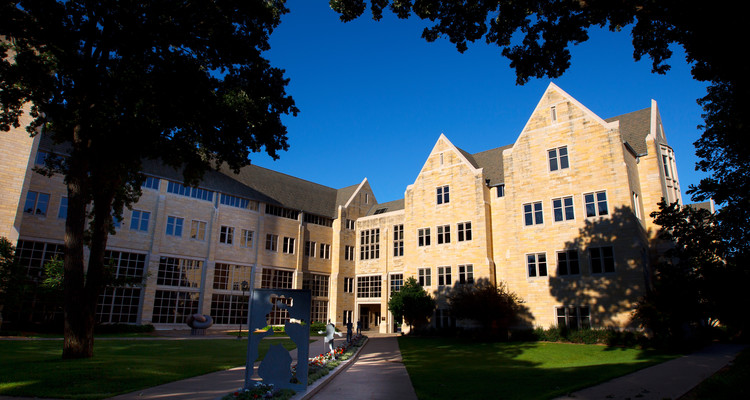Last summer, St. Thomas was one of 57 schools to receive a highly competitive, five-year, $1 million Howard Hughes Medical Institute (HHMI) Inclusive Excellence Grant to support efforts to engage all students in STEM fields.
St. Thomas’ efforts are focused on faculty development and learning about implicit racial and economic biases, the redesign of introductory courses and the introduction of strengths-based mentoring into advising.
College of Arts and Sciences’ Roxanne Prichard, professor of psychology and neuroscience, and Melissa Loe, associate professor of mathematics, are co-directors of the grant. Prichard said the lack of diversity in STEM fields is cause for concern.
“The goal of the grant is to really transform the whole culture to be more inclusive,” Prichard said. “We’re piloting it in STEM where we see the greatest discrepancies nationally in outcomes, but we’re hoping that whatever we learn from this is applicable to the entire university.”
In January, Roberto Zayas came on board as associate director of the HHMI project. A neuroscientist and patent lawyer, Zayas started down his path in science through HHMI-funded research at the University of Puerto Rico.
“As a scientist and a person of color, I am very invested in bringing more diversity to STEM fields,” Zayas said. “As an undergrad back in 1994, I was part of a program funded by HHMI. The program allowed me, as a first-year student and even the summer before college, to take college-level courses at the university and do research while I was an undergraduate. Because of that program, I ended up in graduate school. It’s something that made a significant difference in my life.”
Inclusive Excellence Grant projects have already begun around campus, including Lunch and Learn sessions for science and engineering faculty to discuss inclusion-related issues. Inclusive Excellence liaisons from almost all STEM departments have also been recruited.
Up next is training for a cohort of faculty to help them develop skills to become more effective academic advisers – inside and outside of the classroom – for underrepresented and first-generation students. A workshop focusing on diversity and inclusion, academic advising and mentoring will be held at the end of May to prepare the cohort for working with a group of first-year students this fall.
“One of the things this synergizes with nicely is the university’s Action Plan to Combat Racism and promote inclusion that is mandating that all full-time faculty need to get training in antibias and bias recognition,” Zayas said. “This could be another opportunity with more of a STEM focus.”
Zayas says he hopes people working on the HHMI Grant are able to develop a set of best practices to be shared across university departments and perhaps at other universities.
“I want the faculty to see their value in what we are trying to achieve,” he said. “What we’re doing will be great for underrepresented students, but I think other students will also benefit from the training that we will be providing and the overall improvement of the culture at St. Thomas. Ultimately, what we are trying to do is that when the grant expires, all the things that we are doing will stick. The changes will persist and be sustainable, and that other departments outside of STEM will see the work that we did and say, ‘This seems to be a good model to improve inclusivity and diversity and we should adopt this.’”
Ann Johnson, associate vice provost for faculty advancement, said she is excited about the work being done through the HHMI grant to achieve the goal of stronger inclusion and equity in science fields.
“For faculty development that is linked to creating an inclusive climate, it can be especially effective to focus on specific disciplinary content and goals as a way of strategizing for diversity,” Johnson said. “There is a history of STEM disciplines being difficult places for women students and underrepresented students, so faculty need to be intentional in how they teach those topics in order to change that pattern. In math, for instance, you have to work against the persistent stereotype that says men are innately better at mathematical thinking. The HHMI funding provides great resources for faculty in science areas and creates incentives for making the kinds of changes that strengthen inclusion.”
Work from grant recipients will be studied at the end of the five-year period.
“The mission from HHMI is really to do 57 experiments to see what works,” Prichard said. “This is a national problem, and we have 57 schools doing 57 different things to collect data as a blueprint for culture change.”







